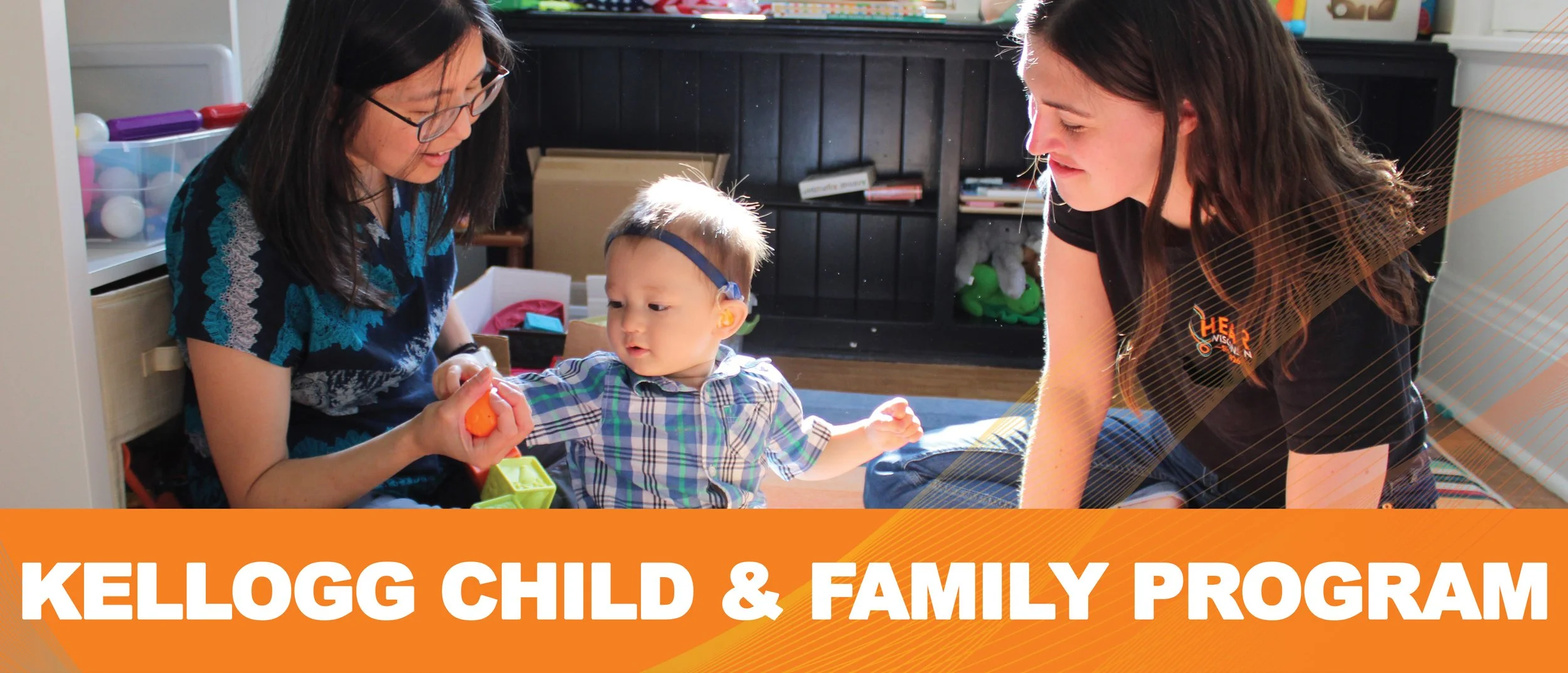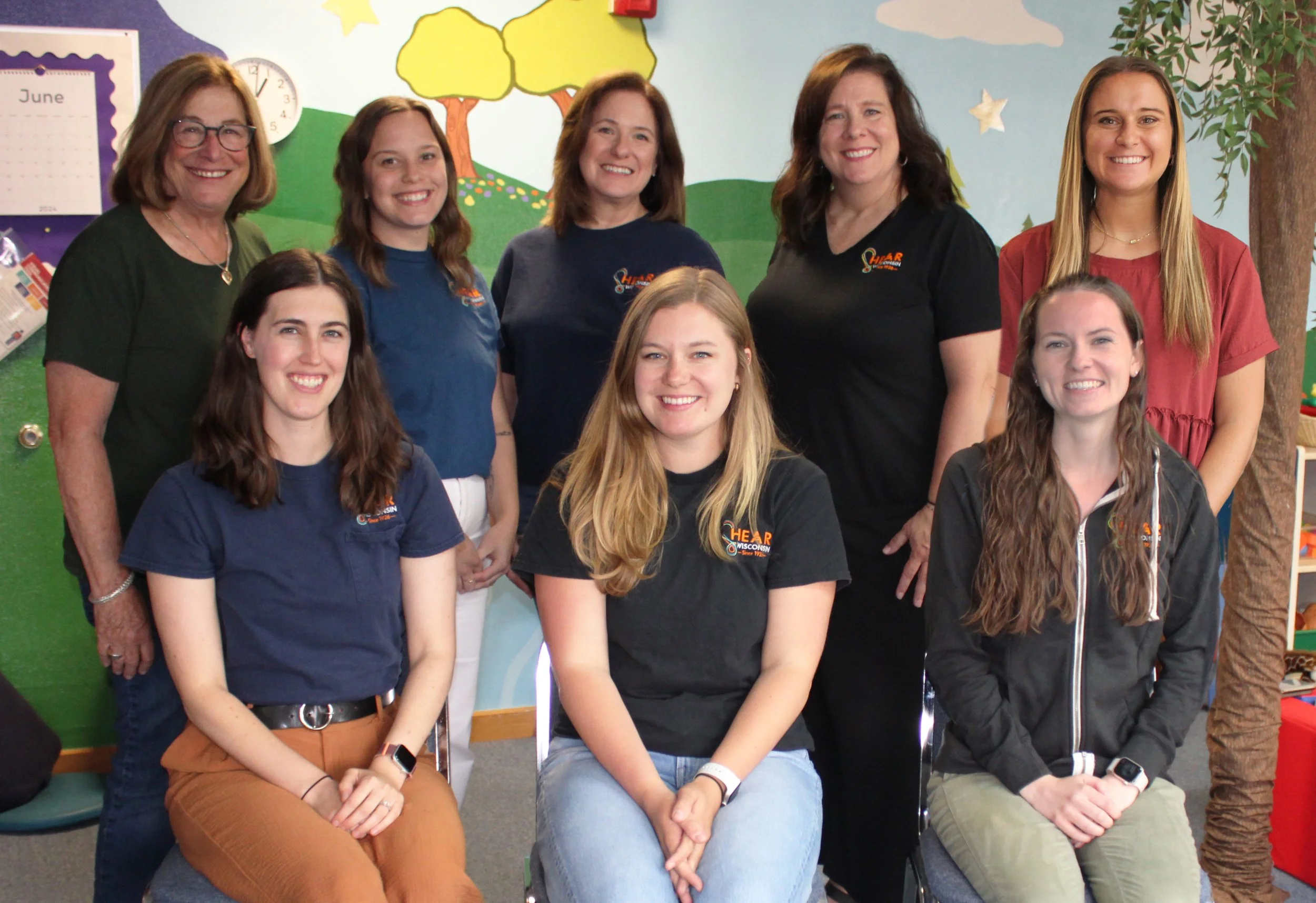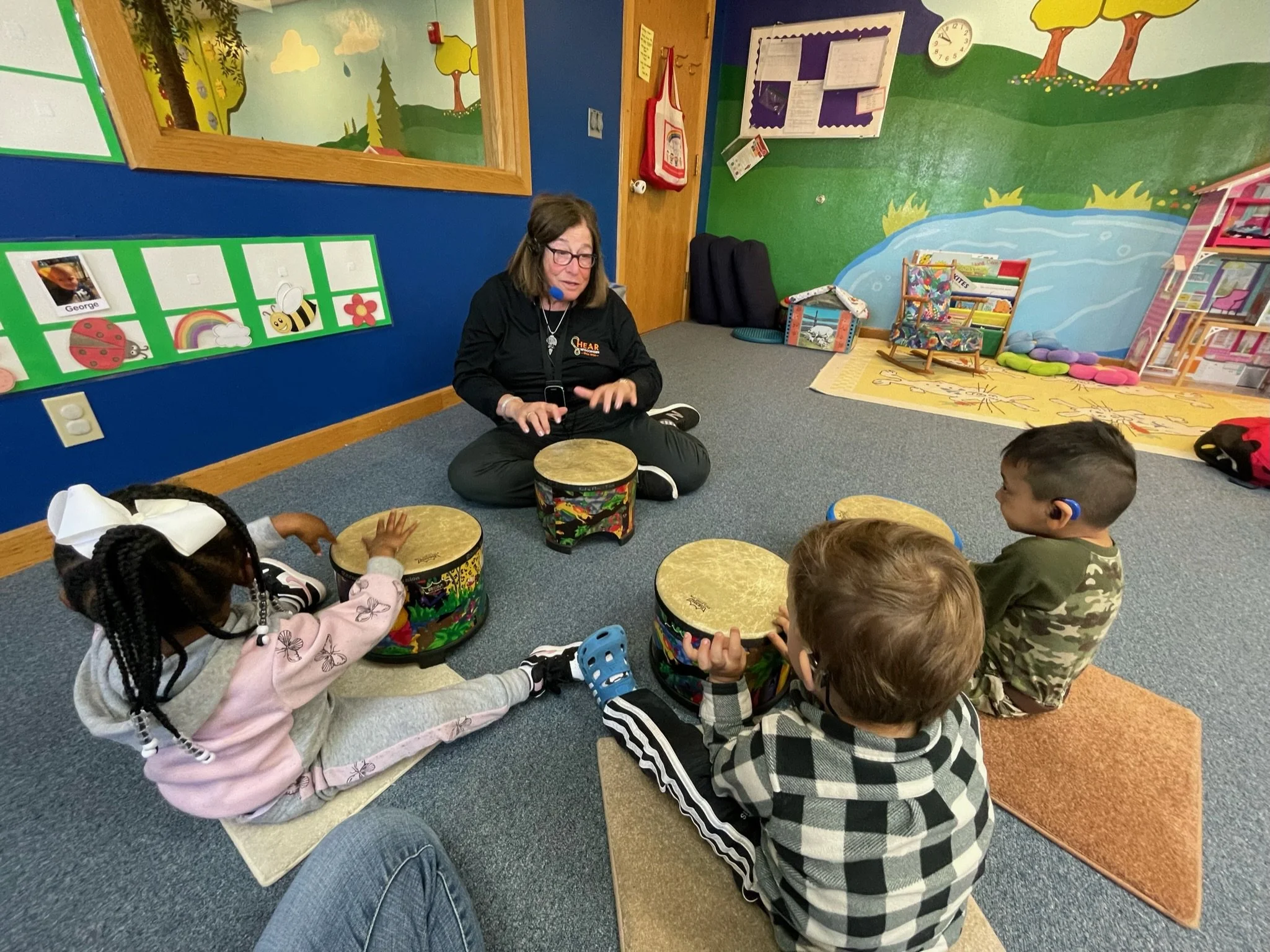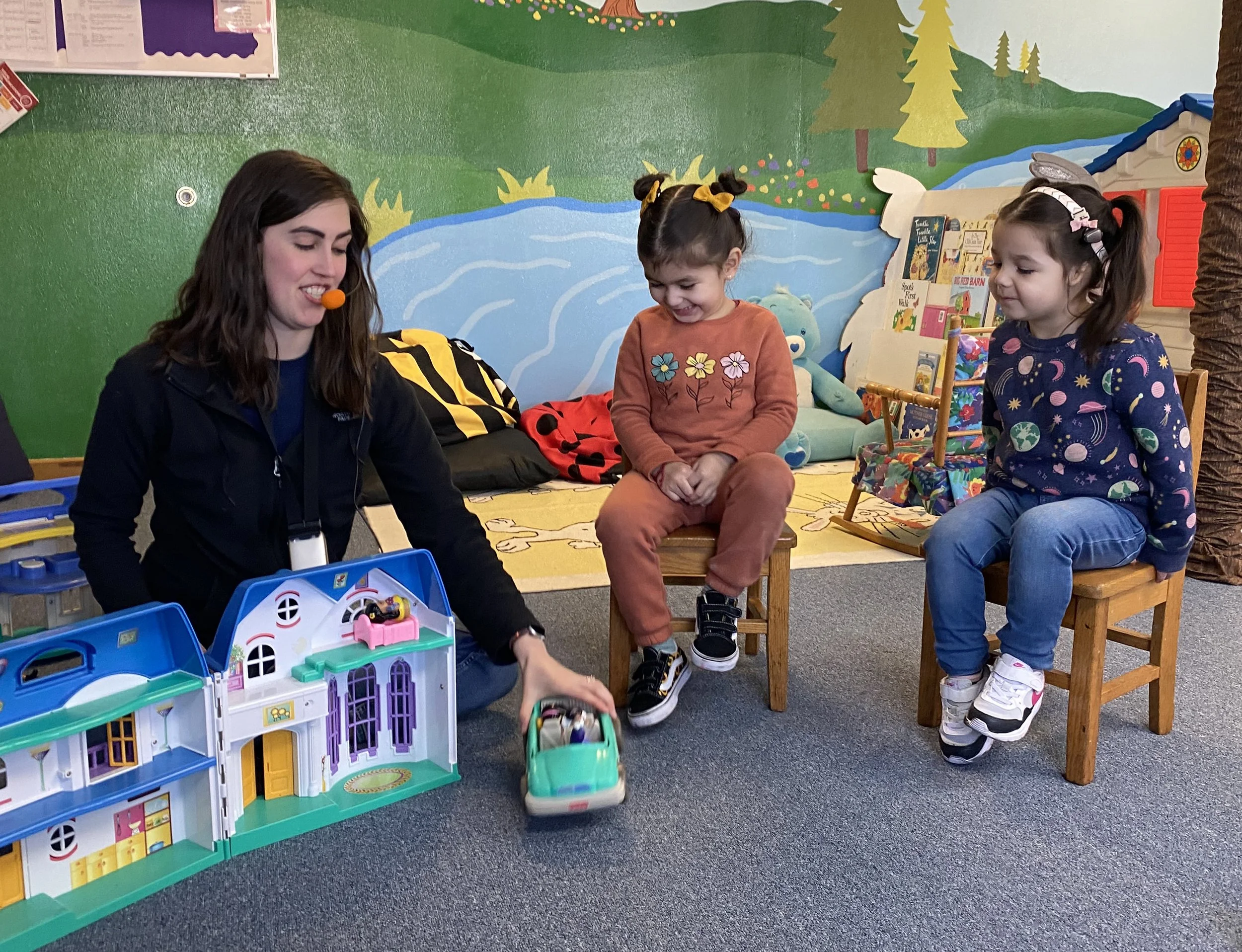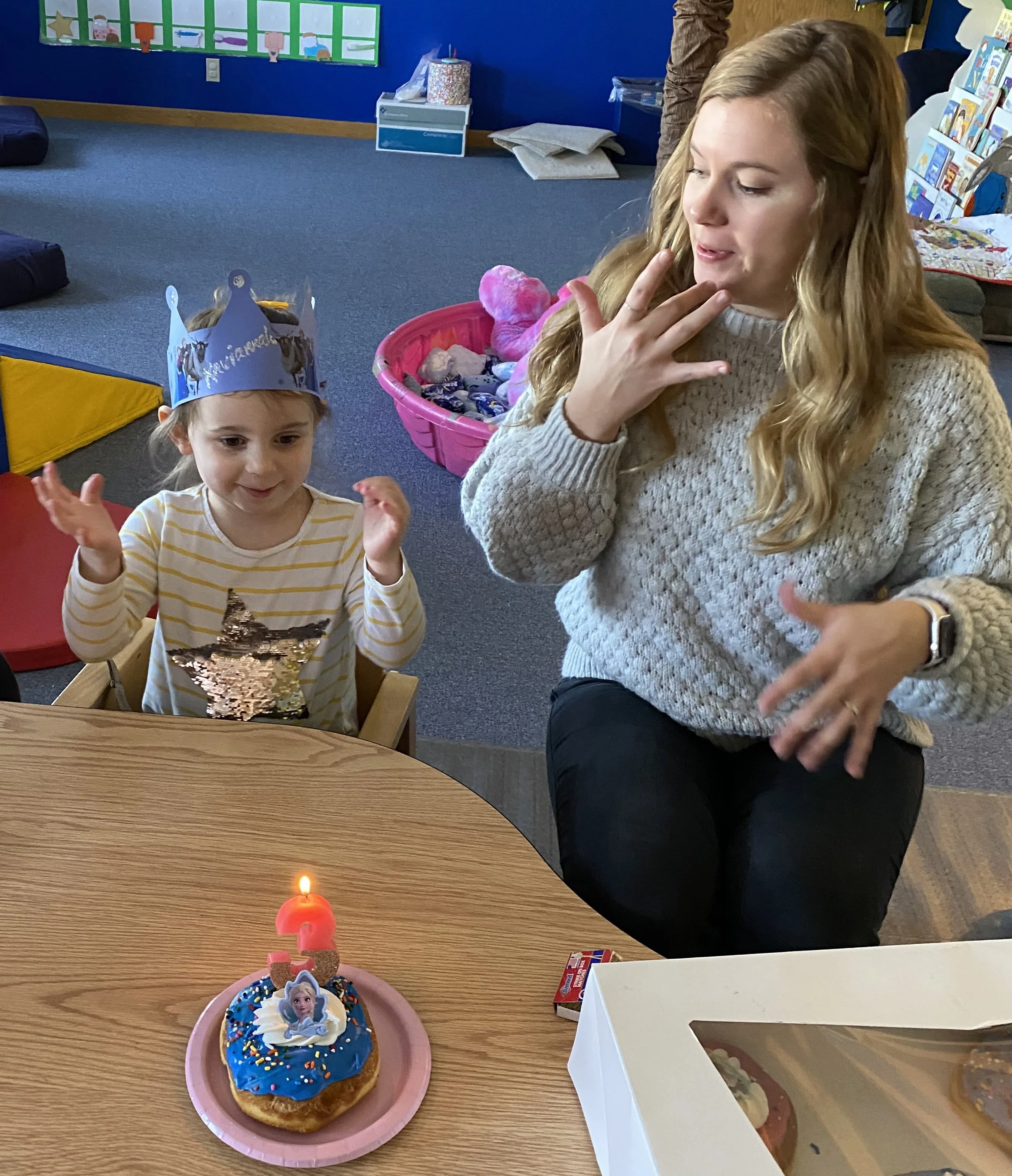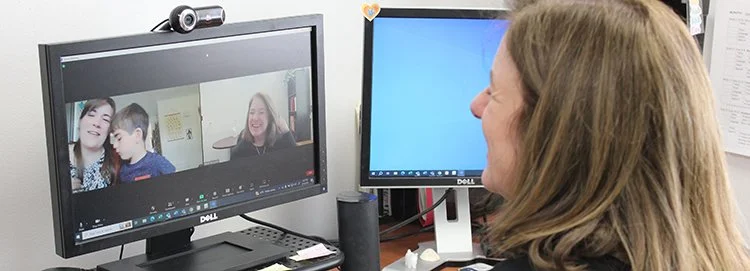At HEAR Wisconsin you will find experienced, caring professionals who are committed to providing unbiased information and a variety of communication choices to help your child reach his or her fullest potential.
early intervention Services
HEAR Wisconsin’s Kellogg Child & Family Program supports children and adults who are d/Deaf or impacted by hearing loss to find the best way to effectively communicate. We provide evidence-based, specialized support to families with children who are d/Deaf or have a hearing loss, as well as for d/Deaf parents with children who are hearing or d/Deaf or hard of hearing.
What do we do: A baby’s first three years of life are critical for auditory, language and speech development. When a baby is diagnosed with a hearing loss, the earlier their family can start services, the better! Children who start receiving specialized support early in life can perform like their peers by the time they enter school.
Our therapists have decades of training and experience working with families of infants and toddlers with all types of hearing loss. We will help your family will learn how to encourage your child’s development of communication, auditory, language, cognitive, speech and social skills.
On-going guidance and support you can learn how to implement auditory, communication and language goals in the home throughout daily routines and play activities.
Individualized suggested activities, resources and learning materials
Ongoing diagnostic assessment and monitoring of your child’s progress
Consultations with Birth to Three providers, Audiologists, schools and other professionals
Services can take place in your home, our office, or a community setting such as a child care facility or even a playground!
More information and resources available on our Kids and Hearing Loss Information page.
Back row (Left to Right): Deb Kravit, MS, CCC-SLP, LSLS Cert. AVEd.; Brooke Ranta; Amy Peters Lalios, MA, CCC-A, LSLS CERT. AVT; Lizabeth Baish; Izzy Koenen, MS, CCC-SLP
Front row (Left to Right): Elizabeth Miller, MS, CCC-SLP; Sydney Champion Elliot, MS, CCC-SLP; Erin Gardner
Toddler Communication Groups
The Toddler Communication Groups provide children who are d/Deaf or hard of hearing an opportunity to interact with same-age peers. Groups are comprised of children from approximately 15 months to 3 years of age. Eight children are enrolled with space reserved for hearing peer role models that help to provide a natural learning environment for all.
The children and adults in each group all use the same communication mode, and the room has many adaptations that make it a good acoustic environment for listening.
Highly-trained professional staff facilitates development of auditory, speech, language, pre-academic, literacy and social communication skills within a language-enriched natural play setting.
Two different Communication Groups are offered with a focus on the family’s chosen mode of communication (Listening and Spoken Language and Total Communication).
Listening and Spoken Language Communication Group
The focus of this group is teaching listening and spoken language as a primary communication mode. Staff experienced with using a variety of listening and spoken language techniques, including some auditory-verbal strategies, encourage children to develop all aspects of spoken language skills to their fullest capacity. Children are expected to learn to listen and to use their spoken communication skills in group and at home. Parents are expected to use and promote listening and spoken language throughout their daily lives and routines in all settings.
Total Communication Group
The focus of this group is teaching simultaneous communication (conceptually accurate sign language and speech). Staff proficient in sign language and highlighting non-verbal communication behaviors, as well as facilitating auditory and speech/vocalization skills, encourage children to develop communication to their fullest capacity. Children are expected to use sign language and speech/vocalization skills in the group and at home. Parents are expected to learn and use sign language throughout their daily lives and routines in all settings.
Activities are designed to encourage the children to use and develop their listening, language, speech, pre-academic, literacy and social skills, using the communication mode the parents have chosen for them. Structured and non-structured activities are based on current best practices regarding educating children who have hearing loss. Monthly themes related to the child’s daily routines and experiences offer opportunities to expand a child’s language foundation. A variety of learning activities related to the theme may include songs, finger-plays, books, storytelling, table time and sensory activities. Staff demonstrates and models developmentally appropriate interactions that are consistent with evidenced-based learning practices designed specifically for the unique needs of children with hearing loss.
Toddler Groups are staffed by Speech-Language Pathologists, Auditory Verbal Therapists and Teacher’s Assistants who have credentials and/or expertise in a specific communication mode. Staff has knowledge and familiarity with the wide variety of amplification and technology options our children may be using including hearing aids, bone-conduction hearing aids (BAHAs) and cochlear implants. Teaching assistants who are d/Deaf or hard of hearing themselves provide positive role models. Staff-supervised university graduate students majoring in Speech-Language Pathology or d/Deaf Education, regularly participate to complete their academic requirements. In addition, a HEAR Wisconsin Teacher of the Deaf and Hard of Hearing with Kindermusik background provides music activities monthly.
Parents and caregivers participate in the opening activity with their child and usually separate from their child afterward to observe the rest of class from our Parent Observation Room. We know that for some children, separating from parents may be an unfamiliar or challenging experience. To ensure a positive experience for all, prior to enrollment, parents work with staff members to create an individualized separation-from-parent plan. Parents are welcome to observe through our one-way window, as well as interact with other parents in the observation room. Parents take turns bringing healthy snacks to group. Parents are given a monthly hand-out that includes theme related ideas for vocabulary, books, songs and language activities for home usage, daily routines and other settings. Parents are reunited with their child after the closing activity and “bye-bye song” with hugs and giggles at the doorway.
Speech-Language Therapy
As a component of both Communication Groups, children who are receiving speech-language therapy are pulled out to receive individual one-half hour sessions by a Speech-Language Pathologist. These sessions focus on increasing auditory, speech and language skills based on individualized goals for the child. Parents actively participate in the session for coaching and guidance of home carry-over activities. For more information about Speech-Language Therapy, contact Amy Lalios.
Auditory-Verbal Therapy
Auditory-Verbal Therapy is a parent-centered approach that focuses on listening as the primary input for learning language. During therapy sessions, the parent, child and therapist engage in activities that teach the child to use sound meaningfully while wearing his or her hearing aid or cochlear implant. Auditory-Verbal Therapy is available at HEAR Wisconsin or as part of our teletherapy program, ConnectHEAR. For more information, contact Amy Lalios.
Parent Support Groups/Education Workshops
Parent support groups are open to any parent who has a child who is deaf or hard of hearing. These groups provide opportunities for open ended, facilitated discussion with other parents of a similar age child or parents of children with similar types of hearing loss. Educational Workshops cover topics of interest to a broad range of parents through guest speakers and panel discussions and are held throughout the year.
Parent Resource Center
The Parent Resource Center is open to all families and provides access to books, DVD's , videos and other materials related to hearing loss, communication options, parenting and Deaf Culture. Internet access is also available to provide a link to additional resources and articles. Materials can be borrowed free of charge.
Parent/Child Sign Language Classes
We offer sign language classes throughout the year to help parents, caregivers and teachers learn to communicate more effectively with children in sign language. No experience necessary. Classes are taught by Deaf adults and class sizes are kept small. You can view our classes on our ASL classes page.
In-home Services
Parent education within the home is designed to meet the needs of each family. What takes place during home visits is determined by the needs and interests indicated by the family and may include information about hearing loss and deafness, communication options, and/or ways to enhance your child’s functional language. Functional communication can include vocalization, speech, use of residual hearing, facial expression, gesturing and/or signing. We can begin working in your home with you and your child from a very early age, sometimes as young as a few weeks old.
ConnectHear teleintervention Therapy
ConnectHEAR is a nationally-recognized program of HEAR Wisconsin that provides families with specialized hearing intervention services no matter where they live by using a laptop, tablet or smartphone. This option is a wonderful way for families who would not ordinarily have access to professionals who have experience in working with children with hearing loss in their geographic region to access specialized services.

